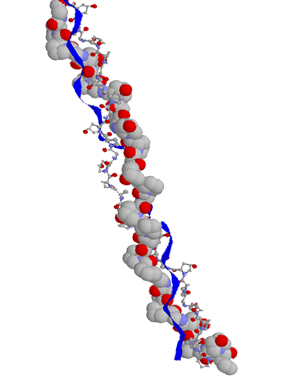Collagen
What is collagen?
Collagen is a group of naturally occurring proteins.
In nature, it is found exclusively in animals, especially in the flesh and connective tissues of mammals. It is the main component of connective tissue, and is the most abundant protein in mammals, making up about 25% to 35% of the whole-body protein content.
Collagen, in the form of elongated fibrils, is mostly found in fibrous tissues such as tendon, ligament and skin, and is also abundant in cornea, cartilage, bone, blood vessels, the gut, and intervertebral disc.
 In muscle tissue it serves as a major component of endomysium. Collagen constitutes 1% to 2% of muscle tissue, and accounts for 6% of the weight of strong, tedious muscles. Gelatin, which is used in food and industry, is collagen that has been irreversibly hydrolyzed.
In muscle tissue it serves as a major component of endomysium. Collagen constitutes 1% to 2% of muscle tissue, and accounts for 6% of the weight of strong, tedious muscles. Gelatin, which is used in food and industry, is collagen that has been irreversibly hydrolyzed.
Collagen has great tensile strength and functions in a manner that is very different from many other types of proteins. For example, it can be found both inside and outside of cells. Collagen fibres are important in contributing to the external structure of cells. However, they are present on the inside of some cells as well.
Collagen works hand-in-hand with elastin in supporting the body’s tissues. Basically, it gives body tissues form and provides firmness and strength; elastin gives the same body tissues much need flexibility. This combination of collagen and elastin is very important in many parts of the body, including, but not limited to, the lungs, bones, and tendons. Even the blood vessels rely on both collagen and elastin.
Often, collagen is discussed in relation to the skin. It works with keratin to provide the skin with strength, flexibility, and resilience. As people age, however, collagen degradation occurs, leading to wrinkles. As such, it is an important substance for those looking for ways to fight the visible effects of aging on the skin. Some skincare professionals actually advise people on ways to stimulate the production of collagen in skin cells.
In addition to being so important in the body, collagen also has many medical uses. It is used in some cosmetic surgery procedures and is sold as a supplement created for joint mobility. It is even used in treating and managing serious burns. For this purpose, it is used in creating man-made skin substitutes.
Since collagens are so important within the body, it stands to reason that collagen deficiencies can be problematic. In fact, there are some genetic diseases that are associated with collagen deficiencies. For example, osteogenesis imperfecta, commonly referred to as brittle bone disease, results from a significantly decreased level of collagen. It can also result from the presence of collagen that is of lower quality than normal.
Types of Collagen
A variety of types of collagen exist in varying quantities in almost all of our organs. When using collagen to enhance the appearances of our skin, we must thus take into consideration not only the amount, but also the type of collagen we choose.
|
Important Types of Collagen
|
|
|
Type I |
The most prevalent type, located in our tendons, bones, skin, and other tissues, particularly scars. |
|
Types II, IX, X & XI |
Merely cartilage, located in various places throughout our bodies. |
|
Type III |
Found in quickly-growing tissue, such as that found in wounds in the early stages of repair, and is often replaced later on by the stronger and tougher Type I collagen. |
|
Type IV |
The filtration membrane of our capillaries, known as basal lamina. |
|
Types V and VI |
Similar to Type I, and generally are not found without it, providing support to normal Type I collagen functions. |
|
Type VII |
Known as epithelia and it lines various tracts of our body, such as the GI and urinary tracts. |
|
Type VIII |
Lines our blood vessels. |
|
Type XII |
Interacts with Types I and III collagen, and can always be found alongside them. |
Types I and III collagen are the most prevalent in our skin, controlling most of our skin’s mechanical properties. Though other types of collagen are less abundant in our skin, and often play a less clear, more supportive role to types I and III collagen, each type serves an important function in the maintenance of our skin.
Uses of Collagen
Collagen is one of the long, fibrous structural proteins whose functions are quite different from those of globular proteins such as enzymes.
Tough bundles of collagen called ''collagen fibres’' are a major component of the extracellular matrix that supports most tissues and gives cells structure from the outside, but collagen is also found inside certain cells. As you age, your body is less able to manufacture a sufficient amount of collagen. Collagen can help maintain your body's repair process.
- IMPROVE CIRCULATION
Collagen can strengthen blood vessels and improve their elasticity. Collagen fortifies your blood vessels to improve circulation throughout the body. Blood and nutrients are delivered to your skin, resulting in healthy, radiant and youthful-looking skin.
- PROMOTE HEALING OF INJURIES
Collagen is needed to repair and rebuild connective tissue to encourage strong muscles, skin and joints. Collagen also strengthens the structure of bones, tendons, cartilage and ligaments. Collagen can encourage muscle mass to regenerate and help athletes recover from sports-related injuries faster.
- RELEIVE ARTHRITIS PAIN
Arthritis is an inflammation in the joints that can cause limited and painful mobility in your hand, arm, shoulder, hip and knee joints. Collagen may increase your joint mobility and reduce arthritis pain.
Collagen helps to keep joints fluid and mobile, but the protein gradually disappears from joints as you age. Taking collagen supplements may help treat joint pain associated with arthritis or aging. Increased levels of collagen could improve your joint's mobility while reducing the pain associated with joint movement.
- REDUCE APPEARANCE OF CELLULITE
Cellulite occurs when fatty tissue pushes upward through fibers into the upper layer of skin. The result is a dimpled appearance of the skin.
Collagen work from the inside of your body to reduce the appearance of cellulite. Collagen promotes your body to rebuild and repair the fibers that cause cellulite to appear.
- REDUCE WRINKLES
As collagen depletes, wrinkles and lines form in those places where the skin moves most--such as joints, forehead and lips. Wrinkles and skin blemishes benefit the most from collagen. Aging is the main cause of wrinkles. However, environment, pollutants and rays from the sun all contribute. Regularly taking collagen encourages your skin to become soft and supple.
- IMPROVE HAIR
Collagen is a major component in hair growth, because it fights off free radicals that can affect your hair's texture, growth and thickness. Restoring collagen in the hair shaft can improve hair growth. Collagen strengthen hair and increase the diameter of individual hairs, giving your hair an overall fuller appearance.
- SCAR TREATMENTS
Collagen injections are sometimes used in a treatment called "tissue fillers." These injections place a pocket of collagen underneath a depressed scar that may result from acne.
This raises the depressed skin up to the same level as the rest of your skin, minimizing or eliminating the appearance of the scar. The downside to this benefit of collagen is the temporary nature of tissue fillers—the collagen's effect will wear off after six months.
Collagen injections are sometimes used in a simple lip-plumping procedure. Contrary to the claims made by some topical skin products, though, collagen is not beneficial when applied to the skin—the molecule is too large to penetrate the selective membrane of your epidermis.
- NUTRITIONAL SUPPLEMENT
Because collagen is a protein, it is made up of different amino acids. These small acid chains are strung together in various sequences to form all proteins necessary to your body's health.
Collagen contains eight of the nine amino acids critical to your body's health—from these amino acids, your body can form all proteins essential to your functioning.
There are 20 amino acids in total, but not all are necessary for your health. Because of this protein benefit, collagen is sometimes featured in bodybuilding or muscle-gain supplements to give your muscles the fuel needed to grow in mass.

Other Uses
Gelatin is produced from collagen and is used in many industries. The most common use of gelatin is in food. Gelatin is used in photographic film and to bind the abrasive particles and the paper in sandpaper. Because it is readily accepted by the body, gelatin is often used in pharmaceutical production.
Tips
Gelatin is the most pure protein available and contains all the amino acids needed by body cells and tissues.
Add gelatin to the diet to improve the condition of hair and nails.
